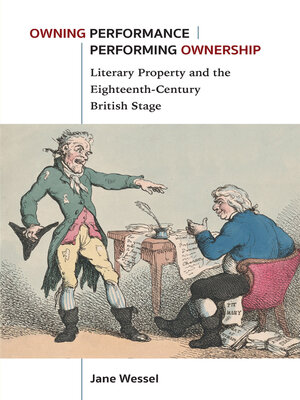Owning Performance | Performing Ownership
ebook ∣ Literary Property and the Eighteenth-Century British Stage
By Jane Wessel

Sign up to save your library
With an OverDrive account, you can save your favorite libraries for at-a-glance information about availability. Find out more about OverDrive accounts.
Find this title in Libby, the library reading app by OverDrive.



Search for a digital library with this title
Title found at these libraries:
| Library Name | Distance |
|---|---|
| Loading... |
In 1710, England's first copyright law gave authors the ability to own their works, but it was not until 1833 that literary property law was extended to protect dramatic performance. Between these dates, generations of playwrights grappled for control over their intellectual property in a cultural and legal environment that treated print differently from performance. As ownership became a central concern for many, actors fought to possess their dramatic parts exclusively, playwrights struggled to control and profit from repeat performances of their works, and managers tried to gain a monopoly over the performance of profitable plays.
Owning Performance follows the careers of some of the 18th century's most influential playwrights, actors, and theater managers as they vied for control over the period's most popular shows. Without protection for dramatic literary property, these figures developed creative extra-legal strategies for controlling the performance of drama—quite literally performing their ownership. Their various strategies resulted in a culture of ephemerality, with many of the period's most popular works existing only in performance and manuscript copies. Author Jane Wessel explores how playwrights and actors developed strategies for owning their works and how, in turn, theater managers appropriated these strategies, putting constant pressure on artists to innovate. Owning Performance reveals the wide-reaching effects of property law on theatrical culture, tracing a turn away from print that affected the circulation, preservation, and legacy of 18th century drama.
Owning Performance follows the careers of some of the 18th century's most influential playwrights, actors, and theater managers as they vied for control over the period's most popular shows. Without protection for dramatic literary property, these figures developed creative extra-legal strategies for controlling the performance of drama—quite literally performing their ownership. Their various strategies resulted in a culture of ephemerality, with many of the period's most popular works existing only in performance and manuscript copies. Author Jane Wessel explores how playwrights and actors developed strategies for owning their works and how, in turn, theater managers appropriated these strategies, putting constant pressure on artists to innovate. Owning Performance reveals the wide-reaching effects of property law on theatrical culture, tracing a turn away from print that affected the circulation, preservation, and legacy of 18th century drama.







